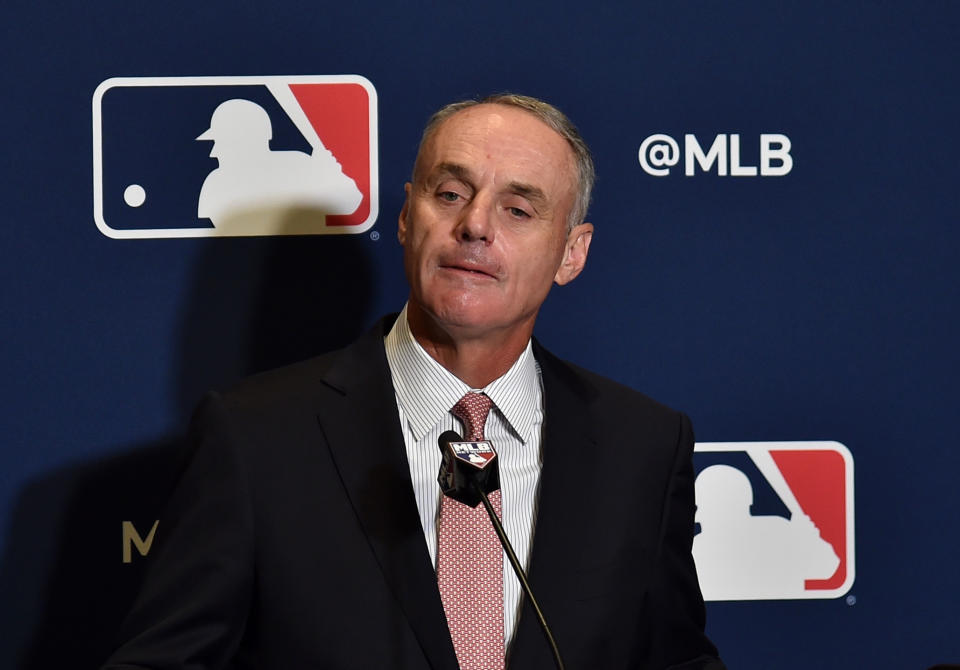Justin Verlander slams MLB, Rob Manfred for 'juiced balls': 'It's a f---ing joke'
Justin Verlander has allowed 26 home runs this season, the most in MLB.
Despite the bevy of long balls, he’s in the midst of an outstanding campaign that will see him start Tuesday’s All-Star game after posting a 2.98 ERA and 0.813 WHIP through the first half of the season.
Based on his fiery words to ESPN’s Jeff Passan on Monday, he thinks those numbers should be even better.
Verlander: ‘It’s a f---ing joke’
Verlander slammed MLB and Rob Manfred, accusing the game of using juiced balls to sate the commissioner’s desire to see more offense in the game.
"It's a f---ing joke," Verlander told ESPN. "Major League Baseball's turning this game into a joke. They own Rawlings, and you've got Manfred up here saying it might be the way they center the pill. They own the f---ing company. If any other $40 billion company bought out a $400 million company and the product changed dramatically, it's not a guess as to what happened. We all know what happened.
“Manfred the first time he came in, what'd he say? He said we want more offense. All of a sudden he comes in, the balls are juiced? It's not coincidence. We're not idiots."

Manfred wanted to ‘inject additional offense’
Manfred took over the commissioner’s post from Bud Selig in 2015. One of his first stated priorities was to find ways to “inject additional offense into the game."
Baseball’s struggled to adapt to the waning attention spans of younger fans who have grown up with their brains altered by the fast-twitch world of smart phones and social media. Long, slow baseball games wanting for offense don’t fit the bill of entertainment for many.
Record-shattering home-run pace
Since Manfred took over, home runs have spiked, with a 60 percent increase in long balls since 2014, according to ESPN. This season sees baseball on a pace for 6,668 home runs, a more than nine percent increase over the MLB record of 6,105 in 2017.
The season didn’t even get past early April before juiced balls became a topic of conversation. An early-season study by Baseball Prospectus determined that drag on balls this year is abnormally low.
What does that mean? In simplest terms, according to the study, “drag is incredibly important in determining how likely a hitter is to knock one out of the park.”
The early-season home run explosion has continued through to the All-Star break, leading to suggestions that teams move back the fences.

Manfred acknowledges balls are different
It’s all added up to a position where Manfred can’t plausibly deny that baseballs are impacting the home run rate. But he does deny that there’s an intent to juice the balls, telling ESPN’s Golic and Wingo that the nature of baseballs being handmade lead to a variance in performance.
"We think what's been going on this year is attributable to the baseball," Manfred said. "Our scientists that have been now studying the baseball more regularly have told us that this year the baseball has a little less drag.
“It doesn't need to change very much in order to produce meaningful change in terms of the way the game is played on the field. We are trying to understand exactly why that happened and build out a manufacturing process that gives us a little more control over what's going on. But you have to remember that our baseball is a handmade product and there's gonna be variation year to year."
Verlander not buying Manfred’s explanation
Verlander’s not interested in Manfred’s explanation about variation. He’s convinced that MLB is in full control of balls having more pop.
"Yes,” Verlander told ESPN about balls being intentionally juiced. “100 percent. They've been using juiced balls in the Home Run Derby forever. They know how to do it. It's not coincidence. I find it really hard to believe that Major League Baseball owns Rawlings and just coincidentally the balls become juiced."
Balls not the only factor in home-run surge
While the consensus remains that the design of baseballs this year is impacting the home run rate, it’s far from the only factor.
Baseball has changed in recent years, as teams and hitters have adapted to hard-throwing pitchers by swinging more for the fences. Analytics have shown that that value of hitting home runs supersedes the downside of increased strike-out rates, leading to an approach at the plate that approaches all-or-nothing.
It’s a statistical revolution that’s led to an increase in baseball’s most exciting play. But it hasn’t exactly made for a more entertaining product. While home runs are fun, they’re often flanked by long stretches of inaction on the field where the ball isn’t even put into play.
As baseball is in the midst of its annual midsummer celebration, it’s also faced with questions about the problems that have plagued MLB for years, with varied approaches to how to fix the game.
Verlander — a 15-year veteran and eight-time All-Star with plenty of clout and very little patience for what he sees as wrong — has made crystal clear where he stands.
More from Yahoo Sports:

